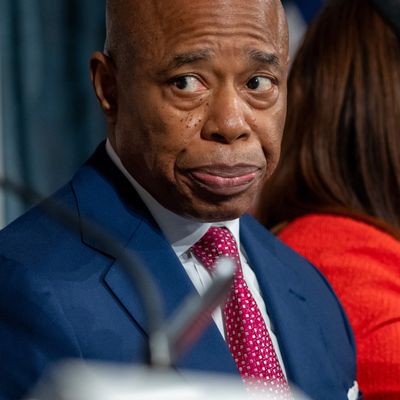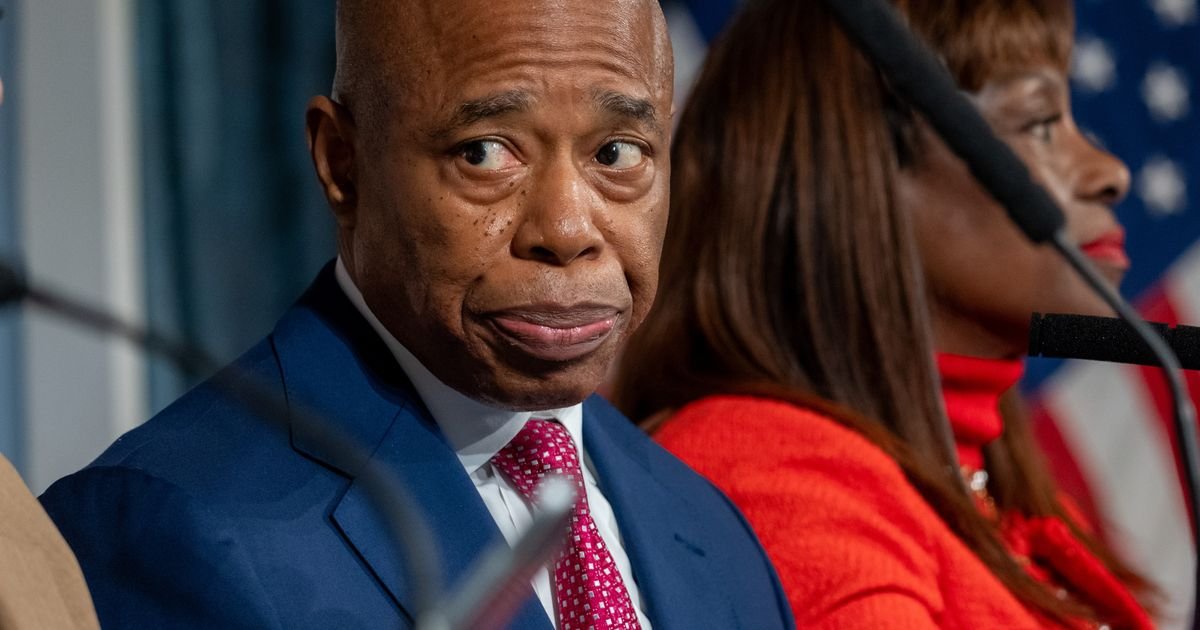
Photo: Spencer Platt/Getty Images
Discussions about challenging Eric Adams for reelection were already intensifying before what was a particularly rough month for the mayor. In early November, news broke of a federal corruption investigation into his campaign and administration in which his chief fundraiser’s home was raided and the mayor’s phones were seized. As Thanksgiving approached, he was accused of a 1993 sexual assault under the look-back window of the state’s Adult Survivors Act. But no one knows where the federal investigation is going and the assault claim, which Adams denies, has not been outlined in detail and will likely take many months to unfold.
Potentially worse for the mayor in the near term is his decision to slash the city’s budget. Though he’s been dealt a challenging fiscal hand by his predecessor and the City Council, as well as by the immense cost of the migrant crisis, Adams is developing a reputation for cutting core city services — this is the second time, for instance, that his face has been splashed across front pages with headlines about slashed library funding.
“The budget cuts can be more troubling for the mayor than the investigations swirling around him,” said Basil Smikle Jr., a Democratic strategist and director of the public-policy program at Hunter College. The investigations require voters to process a complicated web of issues, players, and allegations, and there is no direct charge of wrongdoing by the mayor, he added. “But voters may feel the effects of shorter library hours, sanitation, education and 3K cuts — all bricks-and-mortar politics. What voters see, touch, and access matters heavily in evaluations of government efficacy and efficiency.”
The cuts have united the ideological spectrum against Adams, from his left (which says there’s enough money to avoid most cuts) to his right (which says his underbudgeting of the cost of migrant care led to unnecessary “emergency” mid-year cuts). Adams, meanwhile, has mostly allowed critics to define the narrative instead of more clearly explaining his choices and how he will minimize the harm to New Yorkers.
“Every time the city has faced a challenge in the last two years, the answer from the administration has been to cut,” said Public Advocate Jumaane Williams, a Democrat whom some progressives would love to see challenge Adams in 2025 but who has said he’s not going to run. “These cuts aren’t abstract and do real harm to our systems of government and New Yorkers relying on those services.”
Critics mostly agree that the administration has spent far too much on emergency contracts with private companies, mostly to provide shelter, and not done enough to rein in overall migrant-related costs with alternate ideas ranging from spending more on legal services so migrants can access work permits to greater use of congregate sites over hotel rooms. They also see Adams’s choices, especially a planned reduction in the city’s police force by thousands of officers, as a transparent move to stir outcry over the cuts — which Adams says he’s forced to make because of the cost of the migrant crisis — to win more federal and state help. The mayor has denied using budget shocks for leverage, though he did quickly get Governor Kathy Hochul to say more aid is on the way.
“I know what I’m doing,” Adams said recently when questioned about his budgeting, “and I need New Yorkers right now to trust me.”
Adams has already promised more drastic cuts in his January budget plan for next fiscal year, warning that even more will be sliced without additional state and federal help. He’s also instructed his administration to start significantly scaling back spending on migrant services.
Justin Brannan, chair of the City Council’s finance committee, has said repeatedly in recent weeks that the “draconian cuts” are not necessary and predicted that many, particularly the police-force reduction, will be reversed once the administration recognizes larger-than-expected tax revenue that continues to arrive in city coffers. (The library cuts, for instance, save just $36 million while shuttering most Sunday service.) Brannan, a Democrat, has also said that the city should tap into its billions in reserves and pledged a plan from the Council to “bridge these gaps without making these wholesale cuts” that will include asking state lawmakers to approve revenue-raisers that are out of the city’s control.
Adams is clearly banking on more outrage being directed at the migrants and the lack of federal help to deal with the crisis than on his decision-making, but it’s risky brinkmanship, especially since he’s dealing with public anger over expansive quality-of-life concerns and the criminal investigation into his campaign and administration.
Both controversies have only further motivated those interested in unseating Adams in 2025 and given more reason for those considering a run against him to take a closer look.
“We are in a moment where all the conversations that were happening before are accelerating and rightly so,” Ana Maria Archila, co-executive director of the progressive New York Working Families Party, told me. “The investigation changes the dynamic a little bit, because it’s one thing to think about running against a mayor who is irresponsible and strong, and another thing to think about running against a mayor who is irresponsible and weak and unpopular, and another thing to think about a special election.”
Calling the centrist Adams “a chaos agent for our city,” Archila said there’s a “big bench” of “excellent potential leaders of the city,” who would actually address the affordability crisis while leading with empathy and unity.
Zellnor Myrie, a Brooklyn state senator, said recently he continues to be approached regularly about running for mayor, and one political strategist said that Myrie’s moves indicate he’s taking more of a “when not if” approach to preparing for a potential run.
Queens state senator Jessica Ramos told me last week that her thinking about her own possible run for mayor has not changed based on recent developments but said the city is ailing with Adams at the helm and there’s widespread concern, including among some labor leaders. “He doesn’t have his priorities straight,” she said, noting that he skipped meetings in Washington, D.C., to return to the city when his fundraiser’s home was raided, “so the priority of New Yorkers should be electing a new mayor.”
Comptroller Brad Lander would be particularly well suited for a special election given his citywide perch and millions of dollars in his campaign war chest. “Since this story broke,” someone close to Lander told me, referring to the federal investigation around Adams, “Brad’s been approached every day by voters on the street and civic leaders asking him to run for mayor.”
Antonio Reynoso, the Brooklyn borough president, has said he’s not running against Adams in 2025, but he remains a target for progressive recruitment and is a vocal critic of the mayor. Speaking at a recent housing event in front of hundreds of attendees, Reynoso sounded like a future mayoral candidate, whether in 2025 or 2029. “We’re just not bold enough,” he said, arguing the city must go much further than what Adams is pursuing on the housing front.
More moderate candidates, from 2021 Democratic-primary runner-up Kathryn Garcia to former governor Andrew Cuomo, who has been polling potential runs for several offices, and others may be readying in case Adams is not a candidate in the next mayoral election. Former comptroller Scott Stringer, who finished fifth in the 2021 Democratic primary, is considering a 2025 bid.
Polling by Marist done just before the budget cuts were announced showed Adams was already suffering with just 37 percent of New Yorkers approving of his job performance as mayor and 54 percent disapproving. As of now, even potential challengers see him as weakened but still formidable for reelection in 2025. “Based on the poll, voters are concerned about the mayor’s legal troubles, but time is on his side,” Smikle said, noting that Adams is still strong with his base of Black and Latino voters. “But the concerns about quality of life are ever present and can raise bigger concerns.”

